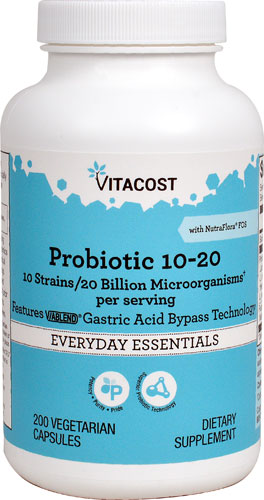From gummies boasting good bacteria to celebrities touting the benefits of friendly flora, it seems that probiotics are nearly everywhere we look.
And, indeed, they are—more than 500 new probiotic products have been brought to the market since 2003. Meanwhile, sales for anything with a probiotic pledge have increased by $1 billion in less than two years.
But what are probiotics, exactly, and what do they have to do with your health?
What are probiotics?
Probiotics are live bacteria that naturally support intestinal balance. The human body contains approximately 400 types of probiotic bacteria—flora that helps us detoxify compounds and make nutrients. They also interact with our immune system in unique ways to foster well-being.
When this delicate intestinal flora becomes imbalanced—whether it’s due to chronic stress, certain medications, GMO foods or intestinal parasites (among other reasons)—it can lead to unpleasant, even health-altering consequences, including digestive upset, abdominal pain, bloating, nausea and fatigue.
Digestive balance
Precisely why—and how—does your digestion become unbalanced?
As described above, the many kinds of flora in your gut can be friendly and health-enhancing. Others, however, can be…not so kind.
A diet high in sugar, for example, provides extra ‘fuel’ to any unfriendly residents you may have in your intestines. Additionally, antibiotics work by virtue of killing bacteria—including that friendly flora that’s so vital to keeping your tummy trouble-free. To make matters worse, there are certain unfriendly flora, resistant to antibiotics, that can flourish when you take these drugs and other medications.
Supporting digestion: the best probiotic strains
Rediscovering digestive health relies in part on restoring that balance of good and bad flora—and this is where probiotic products and foods come in.
You ingest friendly flora routinely if you eat yogurt or drink acidophilus milk. However, these aren’t the smartest options if you’re allergic to dairy products or if you have IBS. If this is the case, the good news is that dairy-free supplements are full of acidophilus—a friendly flora that can support intestinal health.
There are many different kinds of probiotics strains; two of the best and most common are lactobacillus and Bifidobacterium bifidum. Studies have found that an abundance of these flora in the intestines can naturally support healthy levels of good bacteria in the body; they also naturally support the breakdown of toxic substances found in food and organically promote immune health.
What’s more, probiotics can naturally encourage a healthy pH balance and facilitate the production of vitamins in the gut.*
Saccharomyces boulardii naturally supports digestive health as well. Commonly known as brewer’s yeast, this strain of friendly flora introduces beneficial active cultures to your small and large intestines and naturally nurtures intestinal cell health. Another terrific probiotic strain is Bifidobacterium longum, which may organically promote a healthy inflammatory response in the body.*
Probiotic products
Thinking about bolstering your intake of probiotics?
First, consider your diet and aim to eat at least one probiotic-rich food per day. If yogurt is indeed part of your regular eating regime, keep in mind that not all yogurts are created equal. While you don’t need to eat yogurt that’s specifically labeled “probiotic,” do ensure that it contains both live and active cultures as certain processes can destroy fundamental bacteria.
Kefir is also a superb choice for naturally promoting intestinal health. Made with fermented cow, goat, or sheep milk, it tastes similar to a drinkable yogurt and features “grains” of yeast and lactic acid bacteria that render it a dense probiotic source.
Fermented vegetables—such as sauerkraut, kimchee, and brined olives—may facilitate the growth of friendly flora as well. Other top options? Miso—a cornerstone of Asian diets that’s made from fermented soybeans, barley, or rice—kvass, natto, tempeh, and kombucha (a fermented black or green tea that’s faintly effervescent and ultra-refreshing).
If you’re thinking about taking a probiotic supplement, conduct some research to determine the brand and strain that may best support your individual needs. (For example, there are probiotics supplements for women or formulas for kids.)
Next, check out the CFU (colony forming unit) count and opt for a product that contains a higher amount of probiotics (preferably between 15 billion and 100 billion) and between 10 and 30 different strains. Additionally, consider brand quality and the reputation of the company from which you’re purchasing.
As Self reminds us, the “FDA doesn’t regulate most probiotics the way it does drugs” while some product labels aren’t always accurate. Finally, select a probiotic that’s refrigerated to keep the cultures alive, check the expiration date, store properly and be consistent.
All that said, one of the most enticing ways to potentially enhance digestive health is with an ounce or two of dark (70% cacao or more) chocolate. Recent research suggests that it can provide antioxidant benefits and support gastrointestinal bacteria health.* Who ever said getting your stomach running smoothly had to be mundane?
*These statements have not been evaluated by the FDA. These products are not intended to diagnose, treat, cure or prevent any disease.






